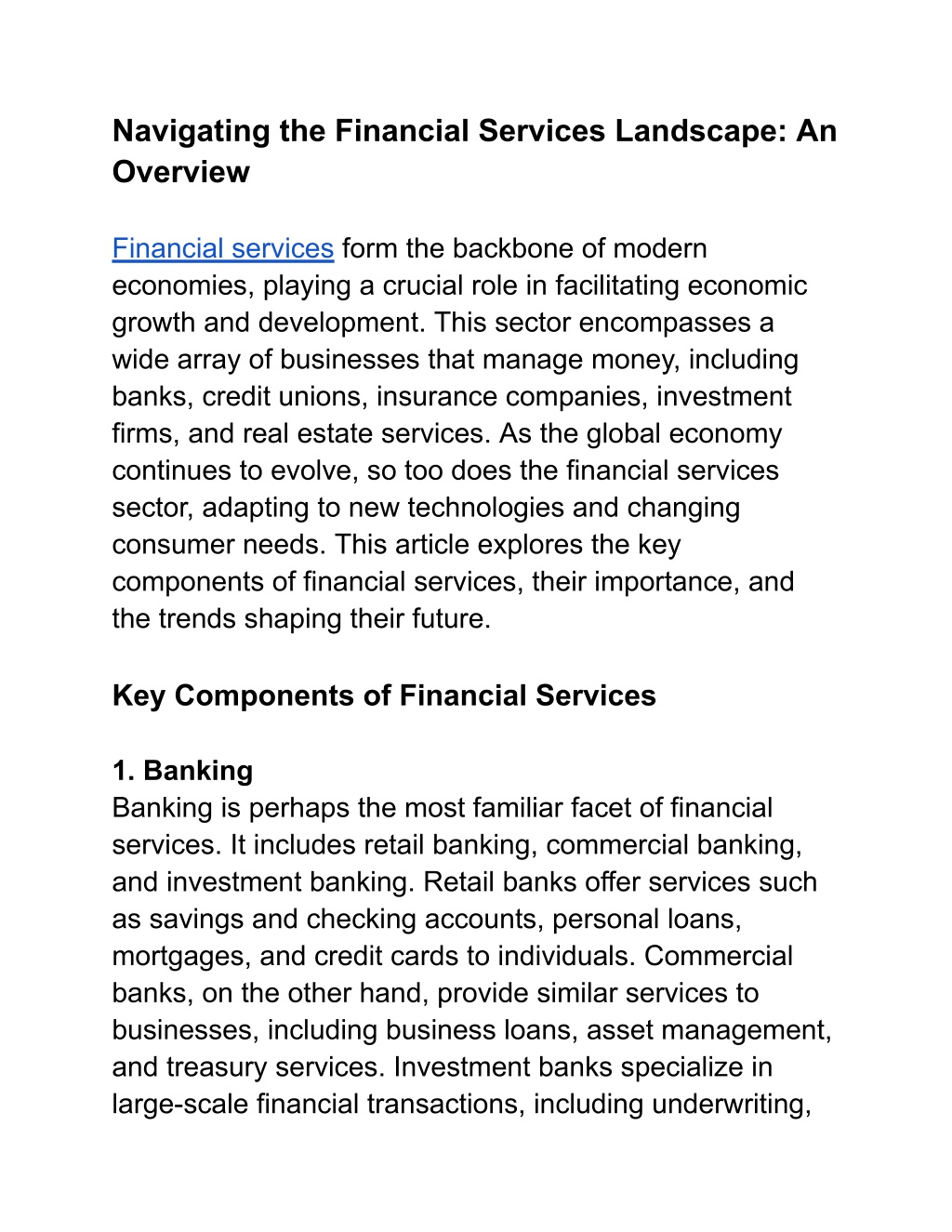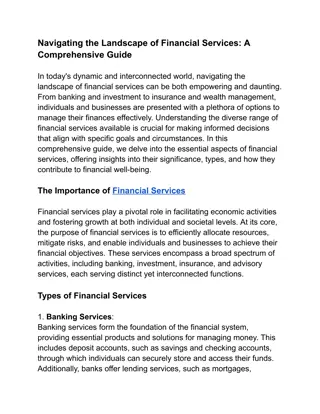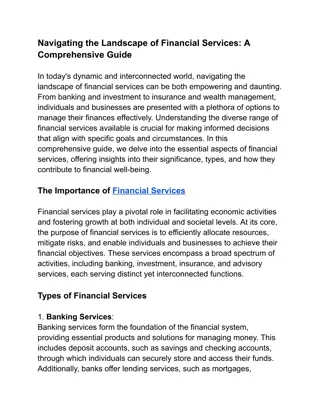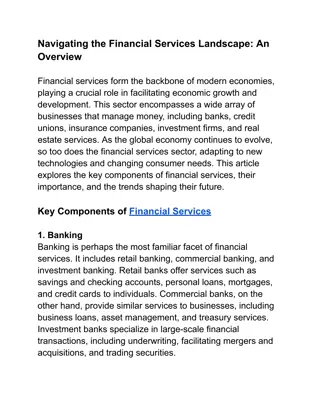
Navigating the Financial Services Landscape_ An Overview
Financial services form the backbone of modern economies, playing a crucial role in facilitating economic growth and development. This sector encompasses a wide array of businesses that manage money, including banks, credit unions, insurance companies, investment firms, and real estate services. As the global economy continues to evolve, so too does the financial services sector, adapting to new technologies and changing consumer needs. This article explores the key components of financial services, their importance, and the trends shaping their future.n
Uploaded on | 0 Views
Download Presentation

Please find below an Image/Link to download the presentation.
The content on the website is provided AS IS for your information and personal use only. It may not be sold, licensed, or shared on other websites without obtaining consent from the author. Download presentation by click this link. If you encounter any issues during the download, it is possible that the publisher has removed the file from their server.
E N D
Presentation Transcript
Navigating the Financial Services Landscape: An Overview Financial services form the backbone of modern economies, playing a crucial role in facilitating economic growth and development. This sector encompasses a wide array of businesses that manage money, including banks, credit unions, insurance companies, investment firms, and real estate services. As the global economy continues to evolve, so too does the financial services sector, adapting to new technologies and changing consumer needs. This article explores the key components of financial services, their importance, and the trends shaping their future. Key Components of Financial Services 1. Banking Banking is perhaps the most familiar facet of financial services. It includes retail banking, commercial banking, and investment banking. Retail banks offer services such as savings and checking accounts, personal loans, mortgages, and credit cards to individuals. Commercial banks, on the other hand, provide similar services to businesses, including business loans, asset management, and treasury services. Investment banks specialize in large-scale financial transactions, including underwriting,
facilitating mergers and acquisitions, and trading securities. 2. Insurance Insurance services protect individuals and businesses against financial loss from unforeseen events. This sector includes life insurance, health insurance, property and casualty insurance, and more specialized products like travel and pet insurance. Insurance companies assess risk and charge premiums to policyholders in exchange for the promise of compensation in the event of a covered loss. 3. Investment Services Investment firms help individuals and institutions grow their wealth through various investment strategies. This includes mutual funds, hedge funds, and pension funds, as well as services provided by financial advisors and wealth management companies. These entities offer expertise in asset allocation, portfolio management, and financial planning. 4. Real Estate Services The real estate sector includes services related to the buying, selling, and management of properties. Real estate agents, brokers, and property management companies facilitate transactions and manage rental properties. Real estate investment trusts (REITs) allow
individuals to invest in real estate portfolios without directly buying properties. 5. Financial Technology (FinTech) FinTech is a rapidly growing area that leverages technology to improve and automate financial services. This includes online banking, mobile payment solutions, peer-to-peer lending, and blockchain technology. FinTech companies aim to make financial services more accessible, efficient, and secure. Importance of Financial Services Financial services are essential for the smooth functioning of the economy. They facilitate capital formation, enable risk management, and provide a mechanism for savings and investment. By offering credit and loans, financial services help businesses expand and innovate, contributing to economic growth and job creation. Insurance services provide a safety net that encourages individuals and businesses to take calculated risks, further driving economic activity. Moreover, financial services support international trade by providing the necessary financing and risk management tools. They also promote financial inclusion by offering
products tailored to underserved populations, thus reducing poverty and inequality. Trends Shaping the Future of Financial Services 1. Digital Transformation The adoption of digital technologies is revolutionizing financial services. Online and mobile banking have become mainstream, offering customers convenience and accessibility. Artificial intelligence (AI) and machine learning are being used for fraud detection, personalized financial advice, and improved customer service through chatbots. 2. Regulatory Changes The financial sector is heavily regulated to ensure stability and protect consumers. Changes in regulations, such as the introduction of the General Data Protection Regulation (GDPR) in Europe and the Dodd-Frank Act in the United States, have significant impacts on how financial services are delivered. Regulatory technology (RegTech) is emerging to help firms comply with complex regulations efficiently.
3. Sustainability and ESG Investing Environmental, social, and governance (ESG) criteria are becoming important considerations for investors. Financial services are adapting by developing products that promote sustainable and socially responsible investing. This trend is driven by increasing awareness of climate change and social issues, as well as demand from socially conscious investors. 4. Cybersecurity As financial services become more digitized, the threat of cyber-attacks increases. Ensuring the security of financial transactions and protecting customer data are top priorities. Investments in cybersecurity measures and collaboration with cybersecurity firms are essential to safeguarding the integrity of financial systems. 5. Blockchain and Cryptocurrencies Blockchain technology and cryptocurrencies like Bitcoin and Ethereum are reshaping the financial landscape. Blockchain offers the potential for more secure, transparent, and efficient transactions. Cryptocurrencies present new opportunities and challenges, prompting financial institutions to explore their integration into traditional financial systems.
Conclusion The financial services sector is a dynamic and integral part of the global economy. Its evolution is driven by technological advancements, regulatory changes, and shifting consumer preferences. As it continues to adapt and innovate, the sector will play a crucial role in fostering economic stability, growth, and inclusivity. Understanding the various components and trends in financial services is essential for navigating this complex and ever-changing landscape.






















